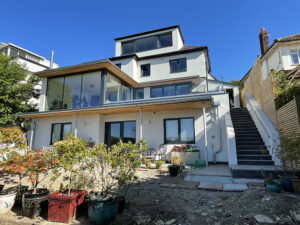Building inspections play a crucial role in ensuring the safety and integrity of structures, whether it’s a residential property, commercial building, or construction project. These inspections involve a thorough examination of the property by a qualified building inspector to identify any potential issues and ensure all work meets building regulations.
However, like any professional service, building inspections come with costs. Cook Brown Building Control is one of the leading Independent Approved Inspectors for Building Control in the UK. In this blog we will explore the various expenses involved in hiring a building inspector, the areas where these costs occur, and what they encompass. Additionally, we will discuss the potential additional expenses associated with a failed inspection and the preparations involved in the inspection process.
Hiring a Building Inspector
When it comes to building inspections, one of the primary costs is hiring a qualified building inspector. The fees charged by building inspectors can vary based on factors such as the location, size, and complexity of the structure being inspected. The experience and expertise of the inspector can also influence the cost.
Building inspectors may charge either a fixed fee or an hourly rate for their services. It is essential to research and obtain quotes from reputable inspectors to ensure you are getting a fair and competitive price. Remember, while cost is a factor to consider, it is crucial not to compromise on the quality of the inspection.
At Cook Brown we offer a bespoke service tailoring our service to your project. Get in touch with one of our experienced team today to get a more detailed quote >
Inspection Coverage
The costs associated with building inspections cover a wide range of areas and aspects of the property being examined. A comprehensive inspection aims to evaluate the overall condition of the structure and identify potential issues or safety concerns. Some common areas covered in a building inspection include:
- Structural Components: Inspectors examine the foundation, walls, roof, and overall structural integrity of the building.
- Electrical Systems: Wiring, outlets, panels, and other electrical components are inspected to ensure they are up to regulation and functioning properly.
- Plumbing Systems: The plumbing system, including pipes, fixtures, and drains, is evaluated for leaks, water pressure, and proper functioning.
- HVAC Systems: Heating, ventilation, and air conditioning systems are inspected for efficiency, safety, and compliance with regulations.
- Safety Features: Inspectors check for the presence and functionality of fire safety equipment, such as smoke detectors and fire extinguishers.
- Interior and Exterior Components: The inspection covers doors, windows, floors, ceilings, insulation, siding, and other visible components.

Additional Costs for Failed Inspections
In some cases, a building inspection may reveal significant issues that need to be addressed. If a property fails the inspection, additional costs may arise to rectify the identified problems. These costs can include repairs, renovations, or upgrades to the building to meet building regulations. It is important to budget for such contingencies when planning for a building inspection.
It is beneficial to work with a building controller from the very start of the project on a consultancy basis. They can work with architects, contractors, and project managers throughout the construction process to review the work and ensure it meets building regulations. This can help minimise unexpected costs as all work will be continuously assessed throughout the process.
Here at Cook Brown Building Control we regularly work with contracts from the very outlay of the project, to review, consult, and inspect projects at every stage of the build to ensure the highest quality of inspection and review.
Learn more about Cook Brown’s consultancy services >
Hiring Experts for Specialised Inspections
In some cases, additional specialized inspections may be necessary, depending on the nature of the property or specific concerns. These inspections can include:
- Environmental Inspections: Some properties may require assessments for environmental hazards like asbestos, lead-based paint, mould, or radon. These inspections ensure compliance with health and safety regulations.
- Structural Engineering Inspections: For complex or unique structures, hiring a structural engineer may be necessary to assess the integrity and stability of the building’s design.
- Property Type: Commercial, public, and high-rise buildings require additional inspections as these have their own specific building regulations to comply with. At Cook Brown, we have worked with a range of projects, including MOD, Crown, and Government Buildings. We are also specialists in assessing high rise buildings.See more of our best projects >
Building inspections are essential for ensuring the safety, functionality, and compliance of structures. The costs involved in building inspections encompass hiring a qualified inspector, the coverage of various aspects of the property, and potential additional expenses associated with failed inspections or pre-inspection preparations. It is important to consider these costs as investments in the long-term safety and value of the property. By working with reputable professionals like us here at Cook Brown, clients can ensure thorough inspections, expert advice, and ultimately, peace of mind.
Cook Brown Building Control – Approved Building Inspector
At Cook Brown Building Control, we understand the importance of a comprehensive and reliable building inspection. Our team of experienced and qualified building inspectors are committed to providing top-notch services to ensure the safety and compliance of your property.
If you have any questions regarding the costs involved in building inspections or would like to schedule an inspection, we invite you to get in touch with us for a bespoke quote. Our friendly and knowledgeable staff will be more than happy to assist you.
Alternatively, take a look at our projects to see how we have helped projects like yours in the past.
Next read: What is an approved inspector? >